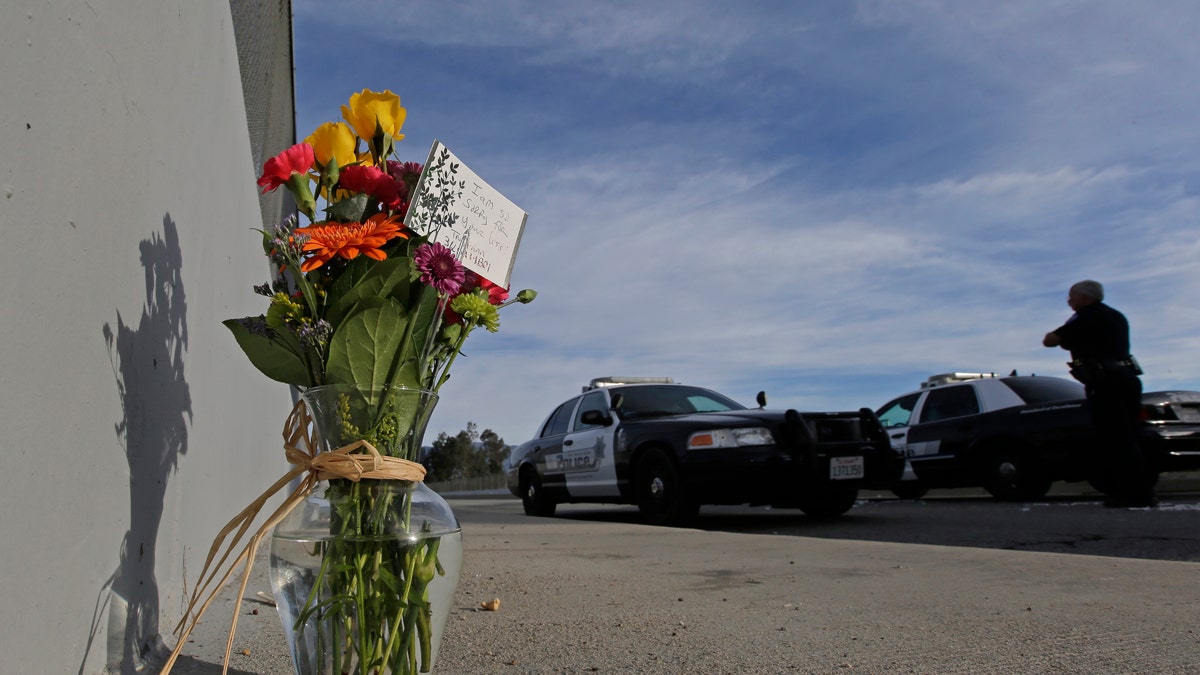
Flowers are left by the side of the road as a San Bernardino police officer blocks the road leading to the site of yesterday's mass shooting on Thursday, Dec. 3, 2015 in San Bernardino, Calif. A heavily armed man and woman dressed for battle opened fire on a holiday banquet for his co-workers Wednesday, killing multiple people and seriously wounding others in a precision assault, authorities said. Hours later, they died in a shootout with police. (AP Photo/Chris Carlson)
In the aftermath of the deplorable acts in San Bernardino and in Paris, the world is again asking: “God, why?”
The question calls for God to give an account of his benevolence in the face of evil.
But “God, why?” is the wrong question; it is too incriminating against God and too numbing to the sufferer. Better, we should ask: “God, now what?”
Evil is very complex. For those who do not believe in God, it’s easy for them to bear a great resentment against people of faith, those who believe in God, when such tragedies occur.
I speak from the experience of having atheists humbly request to attend our church services in the aftermath of tragedies like 9/11. They couldn’t handle the pain of catastrophe without the solace associated with God.
As a former atheist turned Christian pastor, I know this feeling so well.
Their attack against God starts from a fair premise: God is omnipotent, omniscient, and benevolent. However, they miss the point by assuming omnipotence means God is all-powerful and can do anything. This is only partially true. Divine omnipotence requires that a matter must be logically consistent and not merely physically possible.
As to the reason for evil, I do not know why evil exists. Yet, evil is not to be assigned to God, since he gave us free will. We choose to do right or wrong, evil or good. And, there are consequences for our actions.
The injustice ISIS and jihadists inflict on innocent people reflects a grave misuse of God-given freedom. Moral evil results from the choices and actions of human beings.
When one of my congregants, gripped by pain or suffering brought on by evil, asks: “God, why?” I offer the wisdom of the Scriptures: “And we know that in all things God works for the good of those who love him, who have been called according to his purpose” (Romans 8:28). In other words: The possibility exists that God can achieve a greater good in allowing evil.
When hurting people ask: Why do babies die? Why are there plane crashes? And, why do terrorists find pleasure in radicalizing naive people to become suicide bombers? I tell them I do not know, because the question of evil is an appeal to mystery.
God thinks differently than we do. He has a reason that is too complicated for our finite minds to comprehend. But, I am sure that God seeks to comfort us in times of trouble.
It would be logically inconsistent for God to claim He loves us had He created us without free will. Had we been created with a pre-disposition to only do “right,” this would mean that a loving God created us without freedom. Therefore, the risk of evil is a necessary part of free existence and the unconditional love of God.
Pain and evil are not adequate excuses to turn away from God. The problem will not diminish or be eliminated by doing so.
Jesus taught us to look forward and not become paralyzed by the question: “God, why?” We should emphasize the “now what” in the wake of this terrible event, as this approach will transform the sufferer towards healing.
I believe, now more than ever, that the world needs a pastor. When senseless tragedy strikes, the human heart aches for comfort; the kind that is an automatic reward of prayer.
I speak from the experience of having atheists humbly request to attend our church services in the aftermath of tragedies like 9/11. They couldn’t handle the pain of catastrophe without the solace associated with God.
My prayer for the residents of San Bernardino and Paris is for their pain to turn them closer to God.
Let’s not get distracted by the soul-numbing question, “God, why?” Rather, let’s all join together on bended knees, as we pray: “God, now what?”




















